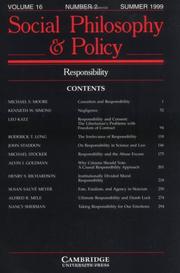| Listing 1 - 10 of 32 | << page >> |
Sort by
|
Book
ISBN: 9781402049514 1402049501 9781402049507 9786613437983 140204951X 1283437988 Year: 2007 Publisher: Dordrecht Springer Netherlands
Abstract | Keywords | Export | Availability | Bookmark
 Loading...
Loading...Choose an application
- Reference Manager
- EndNote
- RefWorks (Direct export to RefWorks)
A Treatise of Legal Philosophy and General Jurisprudence is the first-ever multivolume treatment of the issues in legal philosophy and general jurisprudence, from both a theoretical and a historical perspective. The work is aimed at jurists as well as legal and practical philosophers. Edited by the renowned theorist Enrico Pattaro and his team, this book is a classical reference work that would be of great interest to legal and practical philosophers as well as to jurists and legal scholar at all levels. The work is divided The theoretical part (published in 2005), consisting of five volumes, covers the main topics of the contemporary debate; the historical part, consisting of six volumes (Volumes 6-8 published in 2007; Volumes 9 and 10, published in 2009; Volume 11 published in 2011 and volume 12 forthcoming in 2012/2013), accounts for the development of legal thought from ancient Greek times through the twentieth century. The entire set will be completed with an index. Volume 6: A History of the Philosophy of Law from the Ancient Greeks to the Scholastics edited by Fred D. Miller, Jr., in association with Carrie-Ann Biondi Volume 6 is the first of the Treatise's historical volumes (following the five theoretical ones) and is dedicated to the philosophers' philosophy of law from ancient Greece to the 16th century. The volume thus begins with the dawning of legal philosophy in Greek and Roman philosophical thought and then covers the birth and development of European medieval legal philosophy, the influence of Judaism and the Islamic philosophers, the revival of Roman and Christian canon law, and the rise of scholastic philosophy in the late Middle Ages, which paved the way for early-modern Western legal philosophy. Volume 7: The Jurists' Philosophy of Law from Rome to the Seventeenth Century edited by Andrea Padovani and Peter Stein Volume 7 is the second of the historical volumes and acts as a complement to the previous Volume 6, discussing from the jurists' perspective what that previous volume discusses from the philosophers' perspective. The subjects of analysis are, first, the Roman jurists' conception of law, second, the metaphysical and logical presuppositions of late medieval legal science, and, lastly, the connection between legal and political thought up to the 17th century. The discussion shows how legal science proceeds at every step of the way, from Rome to early modern times, as an enterprise that cannot be untangled from other forms of thought, thus giving rise to an interest in logic, medieval theology, philosophy, and politics all areas where legal science has had an influence. Volume 8: A History of the Philosophy of Law in The Common Law World, 1600-1900 by Michael Lobban Volume 8, the third of the historical volumes, offers a history of legal philosophy in common-law countries from the 17th to the 19th century. Its main focus (like that of Volume 9) is on the ways in which jurists and legal philosophers thought about law and legal reasoning. The volume begins with a discussion of the common law mind' as it evolved in late medieval and early modern England. It goes on to examine the different jurisprudential traditions which developed in England and the United States, showing that while Coke's vision of the common law continued to exert a strong influence on American jurists, in England a more positivist approach took root, which found its fullest articulation in the work of Bentham and Austin.
Philosophy. --- Philosophy of Law. --- Theories of Law, Philosophy of Law, Legal History. --- Law, general. --- Philosophy (General). --- Philosophy of law. --- Law. --- Droit --- Jurisprudence --- Law --- Philosophy
Book
ISBN: 9400793561 9400760035 9400760043 Year: 2013 Publisher: Dordrecht ; New York : Springer,
Abstract | Keywords | Export | Availability | Bookmark
 Loading...
Loading...Choose an application
- Reference Manager
- EndNote
- RefWorks (Direct export to RefWorks)
This distinctive collection of original articles features contributions from many of the leading scholars of ancient Greek philosophy. They explore the concept of reason and the method of analysis and the central role they play in the philosophies of Socrates, Plato, and Aristotle. They engage with salient themes in metaphysics, epistemology, ethics, and political theory, as well as tracing links between each thinker’s ideas on selected topics. The volume contains analyses of Plato’s Socrates, focusing on his views of moral psychology, the obligation to obey the law, the foundations of politics, justice and retribution, and Socratic virtue. On Plato’s Republic, the discussions cover the relationship between politics and philosophy, the primacy of reason over the soul’s non-rational capacities, the analogy of the city and the soul, and our responsibility for choosing how we live our own lives. The anthology also probes Plato’s analysis of logos (reason or language) which underlies his philosophy including the theory of forms. A quartet of reflections explores Aristotelian themes including the connections between knowledge and belief, the nature of essence and function, and his theories of virtue and grace. The volume begins with an intellectual memoir by David Keyt that recounts his adventures as a philosopher and scholar during the rise of analytic classical scholarship in the past century. Along the way, Keyt relates entertaining anecdotes involving major figures in modern academic philosophy. Blending academic authority with creative flair and demonstrating the continuing interest of ancient Greek philosophy, this book will be a valuable addition to the libraries of all those studying and researching the origins of Western philosophy.
Philosophy, Ancient. --- Santas, Gerasimos Xenophon. --- Philosophy, Ancient --- Reason --- Philosophy & Religion --- Logic --- Philosophy --- Reasoning --- Political science --- History --- Administration --- Civil government --- Commonwealth, The --- Government --- Political theory --- Political thought --- Politics --- Science, Political --- Argumentation --- Ratiocination --- Philosophy. --- Ethics. --- Metaphysics. --- Classical Philosophy. --- Social sciences --- State, The --- Thought and thinking --- Judgment (Logic) --- Philosophy, classical. --- Deontology --- Ethics, Primitive --- Ethology --- Moral philosophy --- Morality --- Morals --- Philosophy, Moral --- Science, Moral --- Values --- God --- Ontology --- Philosophy of mind --- Ancient philosophy --- Greek philosophy --- Philosophy, Greek --- Philosophy, Roman --- Roman philosophy --- Plato. --- Aristotle. --- Aristoteles --- Aristote --- Aristotle --- Arisṭāṭṭil --- Aristo, --- Aristotel --- Aristotele --- Aristóteles, --- Aristòtil --- Aristotile --- Arisṭū --- Arisṭūṭālīs --- Arisutoteresu --- Arystoteles --- Ya-li-shih-to-te --- Ya-li-ssu-to-te --- Yalishiduode --- Yalisiduode --- Ἀριστοτέλης --- Αριστοτέλης --- Аристотел --- ארסטו --- אריםטו --- אריסטו --- אריסטוטלס --- אריסטוטלוס --- אריסטוטליס --- أرسطاطاليس --- أرسططاليس --- أرسطو --- أرسطوطالس --- أرسطوطاليس --- ابن رشد --- اريسطو --- Pseudo Aristotele --- Pseudo-Aristotle --- アリストテレス --- Platon --- Plato --- Aflāṭūn --- Aplaton --- Bolatu --- Platonas --- Platone --- Po-la-tʻu --- Pʻŭllatʻo --- Pʻŭllatʻon --- Pʻuratʻon --- Πλάτων --- אפלטון --- פלאטא --- פלאטאן --- פלאטו --- أفلاطون --- 柏拉圖 --- 플라톤 --- Платон --- プラトン

ISBN: 0521457246 9780521457248 9780511573040 0511573049 Year: 1993 Publisher: Cambridge Cambridge University Press
Abstract | Keywords | Export | Availability | Bookmark
 Loading...
Loading...Choose an application
- Reference Manager
- EndNote
- RefWorks (Direct export to RefWorks)
With the collapse of communist totalitarianism, the countries of Eastern Europe and the former Soviet Union face political instability and an uncertain economic future. The people of the region are struggling to emulate the success of the West by moving toward Western-style democracy and markets. The essays in this volume address the liberal transition currently underway. Some of them explore the models offered by political theorists to guide the course of reforms. Some discuss obstacles to change posed by existing attitudes, institutions and cultural traditions. Some examine the nature of liberalism itself, and consider whether democratic politics and free-market economics can coexist without undermining one another. Some offer alternatives to specific Western institutions, arguing that in certain cases it would be unwise for the East to follow the West. Addressing the issues from a variety of perspectives, the contributors to this volume offer valuable insights into the nature of liberalism and the problems facing liberal reformers today.
Post-communism --- Postcommunisme --- Europe, Eastern --- Former Soviet republics --- Europe de l'Est --- Ex-URSS --- Economic policy --- Politique économique --- #SBIB:328H27 --- #SBIB:35H6020 --- AA / International- internationaal --- EEU / Central & Eastern Europe --- SU / Soviet Union - Ussr - Urss --- 330.00 --- 330.52 --- 330.540 --- Instellingen en beleid: Midden- en Centraal Europa: algemeen --- Bestuur en beleid: nationale en regionale studies: Oost-Europa --- Economische en sociale theorieën: algemeenheden. --- Liberaal systeem. Neo-liberalisme. Theorie van de onderhandeling. --- Socialistische stelsels: algemeenheden. --- Politique économique --- Europe [Eastern ] --- 1989 --- -Former Soviet republics --- Europe, Eastern - Economic policy - 1989 --- -Europe [Eastern ] --- -Post-communism --- Economische en sociale theorieën: algemeenheden --- Liberaal systeem. Neo-liberalisme. Theorie van de onderhandeling --- Socialistische stelsels: algemeenheden --- Economic policy. --- Arts and Humanities --- History --- Europe, Eastern - Economic policy - 1989-
Book
ISBN: 0631173056 Year: 1990 Publisher: Oxford Blackwell
Abstract | Keywords | Export | Availability | Bookmark
 Loading...
Loading...Choose an application
- Reference Manager
- EndNote
- RefWorks (Direct export to RefWorks)
Ethics --- Political ethics --- Political science --- -Social ethics --- Social problems --- Sociology --- Administration --- Civil government --- Commonwealth, The --- Government --- Political theory --- Political thought --- Politics --- Science, Political --- Social sciences --- State, The --- Ethics, Political --- Ethics in government --- Government ethics --- Politics, Practical --- Civics --- Deontology --- Ethics, Primitive --- Ethology --- Moral philosophy --- Morality --- Morals --- Philosophy, Moral --- Science, Moral --- Philosophy --- Values --- Moral and ethical aspects --- Ethics. --- Political ethics. --- Social ethics. --- Philosophy. --- Social ethics --- Political philosophy
Book
ISBN: 9025710085 9031701505 Year: 1978 Publisher: Averbode Altiora
Abstract | Keywords | Export | Availability | Bookmark
 Loading...
Loading...Choose an application
- Reference Manager
- EndNote
- RefWorks (Direct export to RefWorks)

ISBN: 0521654505 0511524102 Year: 1999 Publisher: Cambridge : Cambridge University Press,
Abstract | Keywords | Export | Availability | Bookmark
 Loading...
Loading...Choose an application
- Reference Manager
- EndNote
- RefWorks (Direct export to RefWorks)
The essays in this volume address questions about responsibility that arise in moral philosophy and legal theory. Some analyse different theories of causality, asking which theory offers the best account of human agency and the most satisfactory resolution of troubling controversies about free will and determinism. Some essays look at responsibility in the legal realm, seeking to determine how the law should assign liability for negligence, or whether the courts should allow defendants to offer excuses for their wrongdoing or to claim some form of 'diminished responsibility'. Other essays explore libertarian views about political freedom and accountability, asking whether libertarian positions on consent, contract law, and responsibility are consistent, or whether restitution is superior to retribution or deterrence as a basis for a theory of corrective justice. Still others examine the notion of partial or divided responsibility, or the relationship between responsibility and the emotions.
Responsibility. --- Responsabilité --- Arts and Humanities --- Philosophy --- Accountability --- Moral responsibility --- Obligation --- Ethics --- Supererogation
Book
ISBN: 9781139151528 9780521175531 9781139189996 1139189999 1139151525 1283378000 9781283378000 9781139187404 1139187406 0521175534 1107213517 1139234692 1139188682 9786613378002 113918508X 1139182773 Year: 2010 Publisher: Cambridge Cambridge University Press
Abstract | Keywords | Export | Availability | Bookmark
 Loading...
Loading...Choose an application
- Reference Manager
- EndNote
- RefWorks (Direct export to RefWorks)
The essays in this volume - written by prominent philosophers, political scientists and legal scholars - address the basic purposes of constitutions and their status as fundamental law. Some deal with specific constitutional provisions: they ask, for example, which branches of government should have the authority to conduct foreign policy, or how the judiciary should be organized, or what role a preamble should play in a nation's founding document. Other essays explore questions of constitutional design: they consider the advantages of a federal system of government, or the challenges of designing a constitution for a pluralistic society - or they ask what form of constitution best promotes personal liberty and economic prosperity.
Constitutional law --- Political science. --- Administration --- Civil government --- Commonwealth, The --- Government --- Political theory --- Political thought --- Politics --- Science, Political --- Social sciences --- State, The --- Philosophy. --- Arts and Humanities --- Philosophy

ISBN: 0511570708 0521644712 9780511570704 Year: 1999 Publisher: Cambridge : Cambridge University Press,
Abstract | Keywords | Export | Availability | Bookmark
 Loading...
Loading...Choose an application
- Reference Manager
- EndNote
- RefWorks (Direct export to RefWorks)
The essays in this volume examine the nature of human flourishing and its relationship to a variety of other key concepts in moral theory. Some of them trace the link between flourishing and human nature, asking whether a theory of human nature can allow us to develop an objective list of goods that are of value to all agents, regardless of their individual purposes or aims. Some essays look at the role of friendships or parent-child relationships in a good life, or seek to determine whether an ethical theory based on human flourishing can accommodate concern for others for their own sake. Other essays analyze the function of families or other social-political institutions in promoting the flourishing of individuals. Still others explore the implications of flourishing for political theory, asking whether considerations of human flourishing can help us to derive principles of social justice.
Arts and Humanities --- Philosophy --- Happiness. --- Gladness --- Emotions --- Cheerfulness --- Contentment --- Pleasure --- Well-being

ISBN: 0511550111 0521534992 Year: 2003 Publisher: Cambridge : Cambridge University Press,
Abstract | Keywords | Export | Availability | Bookmark
 Loading...
Loading...Choose an application
- Reference Manager
- EndNote
- RefWorks (Direct export to RefWorks)
A central idea in moral and political philosophy, 'autonomy' is generally understood as some form of self-governance or self-direction. Certain Stoics, modern philosophers such as Spinoza, and most importantly, Immanuel Kant, are among the great philosophers who have offered important insights on the concept. Some theorists analyze autonomy in terms of the self being moved by its higher-order desires. Others argue that autonomy must be understood in terms of acting from reason or from a sense of moral duty independent of the passions. Autonomy seems closely related to the notion of freedom, but in what sense: freedom from coercion, freedom from psychological constraints, or freedom from material necessity? Various approaches to these and similar questions yield different implications for public policy. Is capitalism, social democracy or socialism more favorable to autonomy? The essays in this volume address these important questions.
Autonomy (Philosophy) --- Philosophy --- History. --- Arts and Humanities

ISBN: 0511573014 0521542219 Year: 2004 Publisher: Cambridge : Cambridge University Press,
Abstract | Keywords | Export | Availability | Bookmark
 Loading...
Loading...Choose an application
- Reference Manager
- EndNote
- RefWorks (Direct export to RefWorks)
Complicating the ancient debate over the intersection of morality and politics are diverse definitions of fundamental concepts: the right and the good, virtue and vice, personal liberty and public interest. Divisions abound, also, about whether politics should be held to a higher moral standard or whether pragmatic considerations or realpolitik should prevail. Perhaps the two poles are represented most conspicuously by Aristotle and Machiavelli. These essays address perennial concerns in political and moral theory and underscore the rekindled yearning of many to hold the political realm to a higher standard despite the skepticism of dissenters who question the likelihood or even the desirability of success.
Political ethics. --- Ethics. --- Deontology --- Ethics, Primitive --- Ethology --- Moral philosophy --- Morality --- Morals --- Philosophy, Moral --- Science, Moral --- Philosophy --- Values --- Ethics, Political --- Ethics in government --- Government ethics --- Political science --- Politics, Practical --- Ethics --- Civics --- Moral and ethical aspects --- Arts and Humanities
| Listing 1 - 10 of 32 | << page >> |
Sort by
|

 Search
Search Feedback
Feedback About UniCat
About UniCat  Help
Help News
News